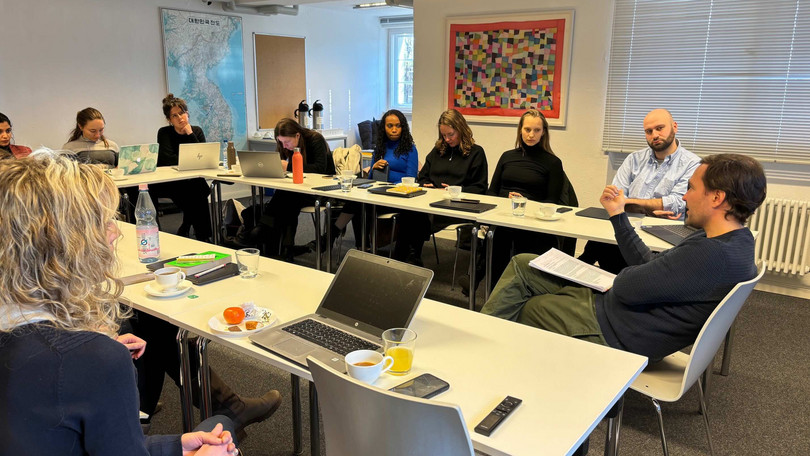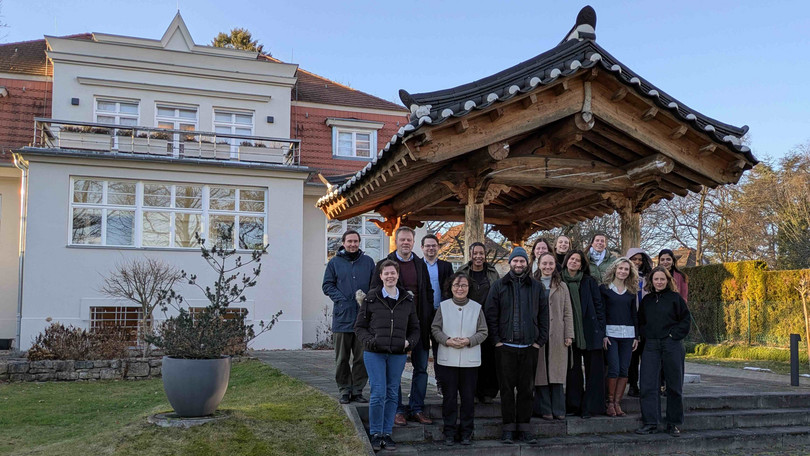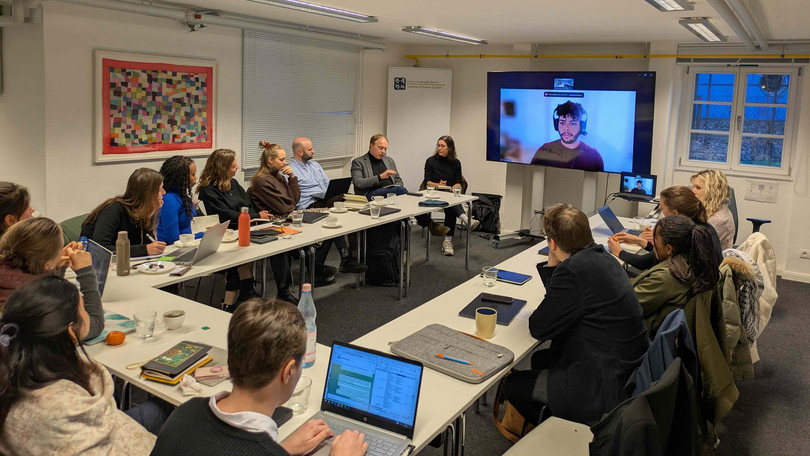Global Europe Lab
The Global Europe Lab brings together 12 early career scholars and junior professionals from various disciplines and backgrounds to discuss and develop a vision for the European Union's (EU) future role on the global stage.
Multilateralism is in crisis, great power politics are making a comeback and the EU is struggling to find its place in this rapidly changing global landscape. The erosion of the transatlantic alliance — previously considered a fundamental and reliable partner in the EU's foreign policy — and violations of the prohibition of the use of force even by UN Security Council member states, such as US and Israeli attacks on Iran and Russia's invasion of Ukraine, force the EU to evolve and act. The EU must also address the urgent need for multilateralism reform, equitable and sustainable global development, and climate change.
In an attempt to spark an initiate for updating the EU’s foreign policy strategy and develop a conclusive agenda in response to these recent global developments, the Joachim Herz Doctoral School of Law and the Bundeskanzler-Helmut-Schmidt-Stiftung (link) are establishing the Global Europe Lab, where these issues will be discussed under the guidance of proven experts. The scientific debate (journal article), interested public (results report) and political debate (thought-provoking, future-driven policy paper) will be addressed and stimulated with appropriate contributions.
Four workshops will take place during the 2025/26 academic year (October 2025 to September 2026) as part of the Global Europe Lab. These workshops will give participants the chance to discuss, research and develop questions about the EU, its foreign policy agenda, and its future role on the world stage, alongside experts from academia and professional practice.
The lab will focus on three main topics:
- trade and sustainable development
- climate change and environmental protection and
- security, peace and international order.
These topics will be linked to case studies and have a regional focus. A combination of expert-led workshops and open discussion sessions will provide participants with the necessary background knowledge while giving them sufficient time to discuss the topics among themselves and to develop strategy or policy recommendations that will result in the written formats mentioned at the end of the project. The expected outcome of the Global Europe Lab is a roadmap setting out a clear vision for the EU's future role vis-à-vis both the major powers and the nations of the “Global South”. It will also develop options for implementing the EU's foreign policy objectives and values in the three thematic areas identified. Once completed, the outcomes will be presented to think tanks, non-governmental organizations, politicians and government institutions.
The Global Europe Lab inaugurated its inaugural workshop at Leuphana University Lüneburg on 03 and 04 November 2025. This provided participants with their first opportunity to come together to discuss Europe's role on the global stage and develop visions for the future.
The programme for the first day comprised introductory sessions, lectures by experts such as Professor Dr. Markus Kotzur (University of Hamburg), Professor Dr. Miriam Prys-Hansen (Leuphana University Lüneburg and GIGA Hamburg), and Julia Ganter (Körber Foundation), as well as campfire discussions. On the second day, Johannes Kummerow facilitated a workshop in which the participants developed foresight scenarios for the EU. Subsequent discussions and results provided an initial insight into the fundamental ideas, thoughts and lines of argument that emerged from the exchange and that could inform the policy paper to be produced throughout the project.
Workshop 2: Trade & Development
18 and 19 January 2026
Institute for Korean Studies at Freie Universität Berlin (link)
Workshop 3: Peace, Security & International Order
16 and 17 March 2026
Joachim Herz Foundation (Link)
Leonie Stamm
Deutsche Gesellschaft für Auswärtige Politik
Since 2021, Leonie Stamm has been a Research Fellow at the German Council on Foreign Relations (DGAP) in Berlin. Her work focuses on gender and feminist approaches in foreign and security policy, including the “Women, Peace and Security” agenda as well as feminist foreign and development policy. In addition, she coordinates the study groups “Strategic Issues,” “European Policy,” and “Global Future Issues.” These groups bring together members of the German Bundestag, ministry officials, and representatives of the foreign policy community for confidential discussions. Their aim is to foster debate on strategic questions of German and European positions and to develop concrete policy options.
Dorothee Falkenberg
Stiftung Wissenschaft und Politik, Fellow bei der Bundeskanzler-Helmut-Schmidt-Stiftung
Dorothée Falkenberg is Programme Manager at the Brussels office of the German Institute for International and Security Affairs/”Stiftung Wissenschaft und Politik” (SWP). Her research focuses on economic security within the thematic working group economic and technological transformations and her fellowship at the Bundeskanzler-Helmut-Schmidt Stiftung. She completed her M.A. in European Studies at KU Leuven and holds a B.A. in Political Science and Law from Leuphana University, with an Erasmus+ exchange at the University of Edinburgh. She worked previously at the European Parliamentary Research Service in the External Policies Unit and at the Bundeskanzler-Helmut-Schmidt-Stiftung in programs focused on global markets, social justice, and European and international politics.
Lea Holst
Bundeskanzler-Helmut-Schmidt-Stiftung
Hello, my name is Lea (Holst). I am originally from Hamburg, Germany, where I also currently live and work. I am part of the BKHS team working on the “Inclusive Geoeconomics” project, which aims to link discussions about the changing international economic order - and the role of the EU in it - with societal goals of social justice. I have an educational background in International Relations and Peace and Security Studies, so I am used to interdisciplinary approaches that aim to “break down silos”. In the past, I have worked in various roles in civil society, focusing on human rights and gender issues - areas in which I also volunteer.
Amon Elpídio
University of Minas Gerais
I am a legal researcher currently living and studying in Belo Horizonte, Brazil. I am pursuing a PhD at the Federal University of Minas Gerais (UFMG), where I am a Research Fellow at the Jean Monnet Center of Excellence. In the spring of 2026, I will begin a period as a visiting doctoral researcher at Université Paris Cité, France. My doctoral thesis focuses on sustainable investments in a just energy transition. I concentrate, in particular, on the European context, exploring the role and importance of energy communities. This research reflects my interest in how law can drive positive and equitable change in the global energy landscape. I completed my master's degree in European and International Law at the Universität des Saarlandes in Germany. I also hold a bachelor's degree in Public Policy and Management from the Federal University of Ceará in Brazil.
Julia Matthäus
Joachim-Herz-Promotionskolleg, Leuphana Universität Lüneburg
I was born in 1994 and grew up in Kassel. After completing my law studies and first state examination at Philipps University in Marburg, including a year abroad at the Université Paris Sud, I moved to Essen for my legal traineeship. Alongside the second state examination, I worked part-time at a university chair and in a law firm focusing on labor law. In 2023, I joined the Joachim Herz Doctoral School at Leuphana University. Encouraged by my doctoral supervisor, I ventured into constitutional and competition law, even though these were not my initial areas of expertise. In my dissertation, I examine the relationship between constitutional and competition law in the context of digitalization. More broadly, I am interested in the intersections of constitutional law, economic regulation, and societal change.
Aditi Mukund
German Chancellor Fellow, Global Public Policy Institute
Aditi Mukund is a German Chancellor Fellow with the Alexander von Humboldt Foundation, based at the Global Public Policy Institute (GPPi), Berlin. She is a researcher focusing on climate, security and foreign policy, gender, and inclusive global governance. Her regional focus includes India-Germany and India-EU relations, the Indian Ocean and the Indo-Pacific. She co-chairs Generation EU-India (GenEI), a youth network aimed at fostering people-to-people relations between young Europeans and Indians across policy areas.
Sarah Diehl
Auswärtiges Amt
Working at the point of intersection of politics, culture and law in an international environment has always been one of my core interests. This motivated me to pursue a career that encompasses all these different fields: after graduating in Public Law (LL.B.), I spend various years working at a cultural institution, the Munich City Library, while simultaneously pursuing a double-degree master in International Relations/Governance (MA). Living and working in Peru, Spain, Paraguay and Hungary allowed me to gain valuable experiences in different working contexts and also to deepen my language skills. To synthesize my interest for foreign languages, politics and culture, I joined the diplomatic corps in 2022. At our HQ in Berlin, I am responsible for coordinating Germany’s cultural and societal cooperation with Southeast Asia, the Pacific and China - a role that I find particularly intriguing given the cultural diversity of the region and its demographic, geopolitical and economic clout.
Julian Sadeghi
DIE ZEIT
Julian Sadeghi is a journalist at DIE ZEIT in Berlin, covering politics, law, and economics. He previously wrote for the culture department of die tageszeitung (taz) and for a student newspaper. He finished his law studies at the Free University of Berlin and Radboud University Nijmegen (German State Exam, LL.B.), focusing on European and International law, as well as German constitutional law. He also spent a year in India.
Nicoletta Maier
Afrika-Verein der deutschen Wirtschaft e.V.
Rachel Nduati
Deutsche Welle
Rachel is a Multimedia Journalist, Presenter and Editor at Deutsche Welle. Her mission is to turn underreported realities into powerful stories that stick. Her reports focus on Human Rights, Policy, Diplomacy, Neocolonialism, Indigenous people, Climate Change, and Food Security.
Rachel Nduati is a journalist from Kenya with a background in international media and communication studies. She has worked in multiple DW offices including Nairobi, Kampala, Berlin and Washington. She is fluent in English, German, Kiswahili, Kikuyu and is currently learning Spanish Before working for DW, she reported across East and Southern Africa, deconstructing various stereotypes about the continent.
Katrin C. Mueller
JOACHIM-HERZ-PROMOTIONSKOLLEG, LEUPHANA UNIVERSITÄT LÜNEBURG
Katrin C. Mueller currently pursues an interdisciplinary PhD project (working title: Mapping Crosslinguistic Legal Transplants in the EU) as a Joachim Herz Doctoral Fellow at Leuphana University Lueneburg, Germany. The project is situated at the crossroads of legal theory, comparative law, EU law and legal linguistics. Katrin also investigates the relationship of law and language, especially in multilingual environments, and the construction of legal meaning. She has presented conference papers inter alia in the United States, the United Kingdom, Germany and Czechia. Prior to her PhD studies, Katrin obtained degrees in law and English linguistics and literature from Ludwig Maximilian University, Munich, Germany, and studied and worked across Germany, the U.K. and Singapore. As a qualified lawyer (Germany), Katrin’s research draws from practical experience in transnational business, corporate and finance law.
Erriketi Tla da Silva
University of Luxemburg, PhD Candidate at Wageningen University & Research






